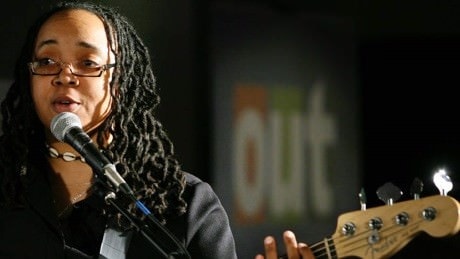There are many delightful and poignant moments in mostly the VOICE: a black lesbian journey. This engaging autobiographical amalgam of poetry, original music, and storytelling—written and performed by j.scales—opened last night in Gallaudet’s Eastman Studio Theatre and establishes j.scales as an important new voice in solo theatrical performance. I say this not only because the black lesbian experience is conspicuously underrepresented on DC stages (which it is). I say this also because j.scales is such a personable, multi-talented, and all-around-enjoyable performer.
j.scales begins by recounting her upbringing in Rochester, where her father worked at Eastman Kodak (a photo in the program shows her as a girl beside snow as high as she is tall). As a black child in the suburbs, she was “living between worlds.” Inspired by Alice Walker’s The Color Purple, she wrote a letter to God to say she felt like a chocolate drop in vanilla ice cream.

With a terrific gift for vocal impersonation, j.scales introduces us to her first crush (jo), her mother, her grandmother, an elderly woman at church, and more. j.scales’s coming out to her mother was difficult; her mother was outraged when she discovered that her daughter had a drawer full of books by and about black lesbians. The experience becomes the setup for a moving song she sings called “does yr mama know?” that audibly landed for the audience.
Hers is an original and contemporary woman’s voice, yet it has, as j.scales makes humbly and abundantly clear, forerunners and foremothers. She makes a point of referencing and revering the books—such as Audre Lorde’s Sister Outsider and Cherríe Moraga and Gloria E. Anzaldúa’s This Bridge Called My Back—that affirmed and inspired her when she was younger and coming out. Literally, she takes the books from a table centerstage and holds them up for us to see. In the context of telling us her personal past, it is a gracious and resonant political gesture.
On that table are other mementos, as of relationships and breakups she has had with various women. Stage right is a mic and stand where she does most of her poetry and storytelling. Stage left is an amp and bass, which she plays at the end on a song called “maybe she thought” that has a touching twist. After exchanging numbers with a woman she met in a CVS and was attracted to, she wonders self-consciously whether the woman was so forthcoming because she thought j.scales was a guy.
As j.scales’s story continues, she enters Howard, finds her way to the local music and poetry scene and queer community (dubbing herself the High Priestess of Homo Hop), and decides to stay in DC, where she has since become well known as a poet, composer, musician, vocalist, and spoken-word artist. That j.scales is a formidable slam-poetry artist was amply evidenced during an eloquently explicit erotic poem that she read from the podium in near darkness. That interlude gave me occasion to appreciate the spotlighted ASL interpreter for this performance, Nikki Gee, whose artistic signing of j.scales’s graphic words was absolutely beautiful to behold.
(All Fringe performances at Gallaudet are ASL interpreted and/or captioned for the Deaf, and the 16 shows booked there this year will give hearing audience members scores of chances to be knocked out by the artistry of sign language in theater as I was again last night.)
mostly the VOICE is j.scales’s first attempt at combining all her gifts into a single solo theater piece, and she has had the good fortune to work on this project with Director Regie Cabico, himself a luminary in DC’s spoken-word scene. The piece in its present Fringe version has untapped potential. j.scales was off book for parts of the show, but there were portions that she read from a script in a black binder that would have been much better by heart—particularly the very funny anecdotal stuff. As she performs the piece more, the unsteadiness of the transitions will likely diminish, and she will become surer of her material and her talent as a solo dramatic performer—both of which are outstanding. Though still a bit shaky, even in this first-time-out form, mostly the VOICE: a black lesbian journey is thoroughly enjoyable and eminently worth seeing.
Running Time: 55 minutes with no intermission.
mostly the VOICE: a black lesbian journey plays through July 26, 2015, at the Eastman Studio Theatre in the Elstad Annex of Gallaudet University – 800 Florida Avenue. NE, in Washington, DC. For schedule of performances and to purchase tickets, go to their Capital Fringe page.




